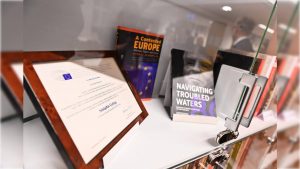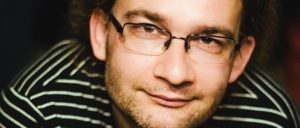On the recommendation of the Dean of the Faculty of Water Sciences at the University of Public Service, the University Senate has awarded an honorary doctorate to Charles J. Vörösmarty, who currently directs a research centre at the City University of New York. After the award ceremony, we spoke with the professor about global water resources and the role of scientists and young people in solving the crisis.
“The water crisis is no longer just a threat, it’s with us every day” – was said during your honorary doctorate laudation. Could you please explain what that means exactly?
Over the last 20 to 25 years, our ability to identify where pressures are occurring in the water system has improved. Such pressure occurs in areas where too many people are trying to use too little of the available water. This often happens in drier areas of the world or during droughts. The western United States is an example of such an area. We are getting better at quantifying the extent of water scarcity. I was among the first to argue that with the new technologies available to us, we can better understand how many people are in crisis. When we did the analysis, we estimated that about one and a half to two billion people were suffering from severe water stress. Previously, that number was estimated at half a billion. So, the number has tripled. We can now track drought-affected areas almost in real time and see that it’s not a technology yet to be developed in the future. Until now, we thought there would be problems, but the crisis is now here and spreading. I think bringing attention to it is an important way to change the way we think about climate change, especially in the United States.
Do you think science should present its views differently or more clearly to decision makers?
I do not share this opinion with everyone, but my philosophy is that as a scientist, I stay out of politics. I advocate staying out of it as a scientist, being objective and systematic, not judging, simply looking at your own information and presenting the best, most accurate data sets, conclusions, and results that you can present as a scientist without having your thinking clouded by a political agenda. A real scientist has no political agenda. A good scientist, in my opinion, simply reports, interprets, and communicates the facts. Of course, if the decision maker is so crazy as to make the wrong decision, there is not much a scientist can do. But scientists are only supposed to communicate information that they interpret, not necessarily advocate or act on. I think we could talk about options. Here’s the first option, this is the consequence. The second option is this, the third is something else. That used to be when I was younger, but now I do not try to make people passionate about doing things that are important to me. I just give ideas, I say here are the numbers for the options. I never try to say, ‘The bailout policy is there, let us do it.” My philosophy is to study the problem first and then work out the alternatives. So, the scientist designs different scenarios for the future and lets the decision makers argue with each other.
What would you advise young people to focus on in their studies?
Let me be a little provocative here. I have talked to scientists and engineers who think I am crazy, but I have also talked to humanities scholars who think I am right. I often feel that my students can solve the problems in the book but cannot yet express themselves properly, cannot argue well, and cannot present well. In a world where decision makers need to communicate facts, clear, concise, factual, and meaningful messages are needed, or the message will be lost. That’s why I believe we should not specialize too early. You must learn from the beginning how a lawyer thinks, how an artist thinks, how a mathematician thinks, how a philosopher thinks, how an environmental scientist thinks, how a doctor thinks. So, the first thing to do is to have a broad horizon. There is a T-shaped knowledge metaphor for this: first spread out the tip of the T, then deepen the stem in at least one or two areas. One can be an excellent mathematician but still understand the water crisis. You can be a good lawyer, but that does not mean you are lost in finance. I love mentoring, working with my students. I am very selective about who I hire: I can only work with motivated people who need gentle guidance and want to move forward on their own.
We also heard in the laudation: you are a man of the world. You also mentioned the mathematician Pál Erdős and that your Erdős-number is three.
For me, interconnectedness is a wonderful feature of life on Earth. I, like everyone else, have had completely crazy random encounters when I was not expecting it It seems crazy at first, but there are billions of opportunities for unexpected interactions in the system, right? That’s the real network we live in. We are going to stumble across these connections, and it would be crazy if they did not exist. Erdős was able to prove that mathematically, the network of people. But there are also networks of problems because our Earth is a connected object. If we start moving one part of the system, what does that do to the other part of the system? That’s not necessarily something that someone who is just an engineer can answer. We may also need to consider the historical perspective of the phenomenon. I may have to look at certain questions from a medical perspective and so on. But I am not saying that everybody must be a doctor, a social scientist, a lawyer, and an engineer all at the same time. I am saying that if you have enough expertise, you can be part of a group that can think so broadly. But you must learn to think, and you must learn to talk to each other. I am a big believer in team-based research and thinking, for which effective communication is essential. On several occasions, in summer programmes with 35 graduate students, we thought about specific goals and specific problems that were urgent for people in the field. This required a biologist to talk with a lawyer or a local cultural expert. I found that by focusing thinking on answering specific questions, we were able to get people from different disciplines to talk in new ways about issues they had never discussed before. This, of course, requires very specific questions so that it does not end up as empty talk.
Academic work requires a lot of concentration, so sometimes you need to relax: when you have free time, what do you do with it, how can you switch off?
I like to cook Hungarian food. You know, my father is 99 years old, and we made a small collection of his recipes with him. If he can help, he shows me the tricks. We mainly make his favorite, the chicken stew. He’s very good at that. I’ve been experimenting with other things myself. I try to do it the way my grandmother did it, and it’s fun, I love it. I also do some music – alone or with friends. I play guitar, but lately I’ve been trying my hand at the banjo, which I admit I’m not that good at. I’m not a singer, so I’m always looking for someone to sing with. That works well too, I can concentrate on what I’m playing. Not to mention, I like to explore new places in New York. I teach at the city’s public university, which has 500,000 students. Not a day goes by that I don’t meet someone from campus – that’s my way of shaking hands with Karinthy.



